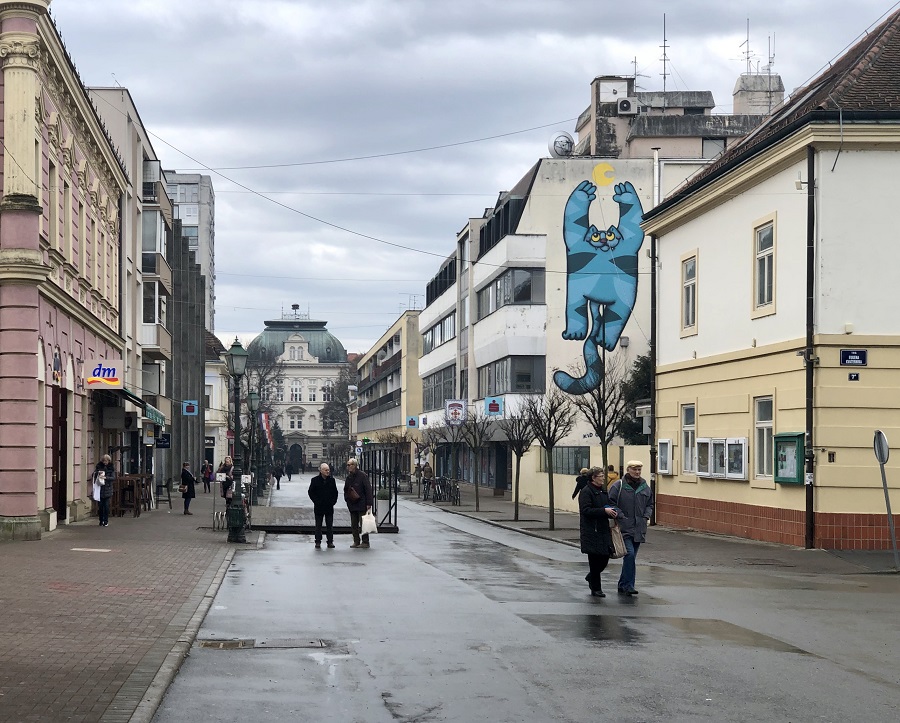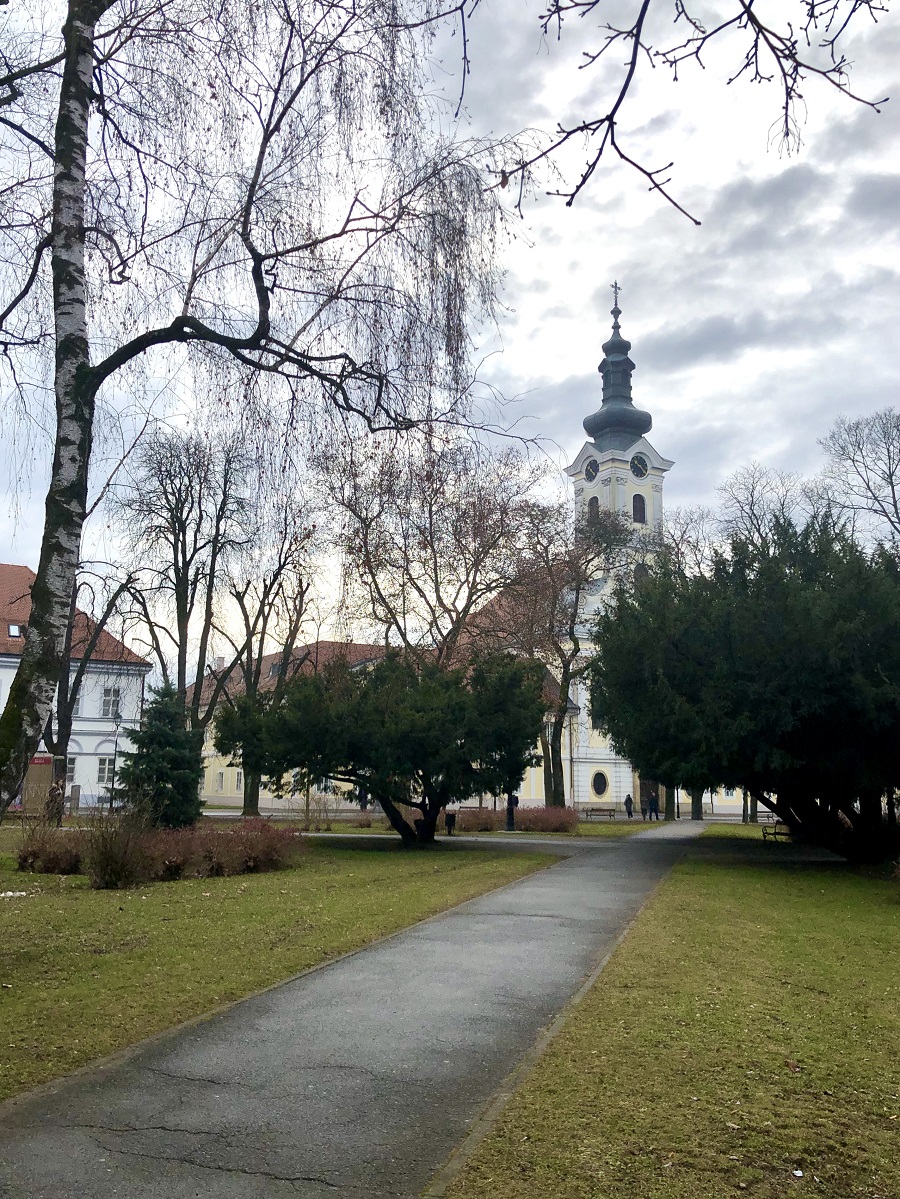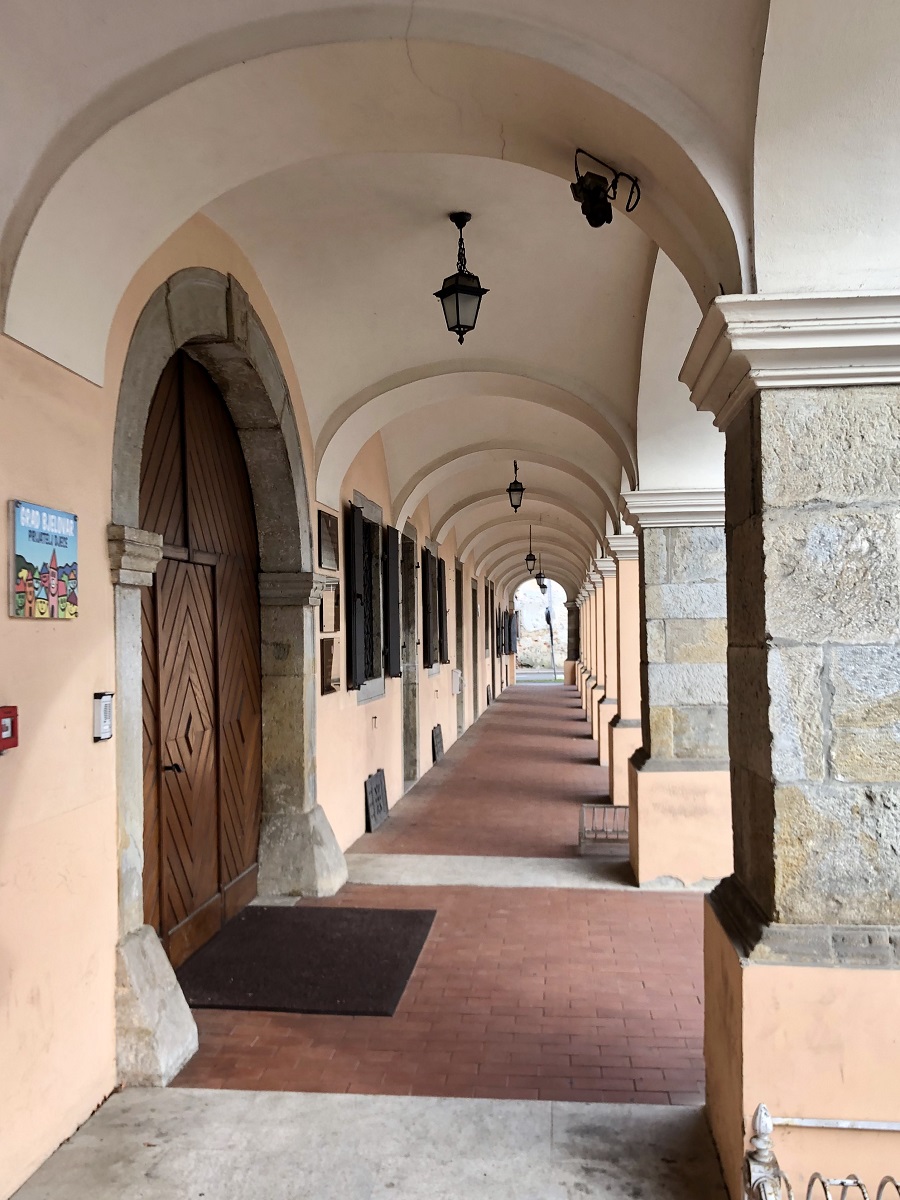Another Day, Another Ministerial Property Scandal Discovered
January 30th, 2020 - Many things can be said about Croatian politicians, but that they don't own enough real estate is not one of those things, as yet another property scandal proves.
After the Croatian media and public realised the problems yet another one of Plenković's ministers had with his property and the incorrectly filled declaration of property yesterday (it was Krstičević), it took less than a day for Index.hr to publish another similar story.
This time it regarded Justice Minister Dražen Bošnjaković, who is reported not to have included over 300 square metres of a backyard into his declaration. Additionally, the backyard is located next to an illegally built house, owned by the minister's wife.
The size of the house from the land registry differs than the size listed in the declaration, and the declaration completely forgets to mention the backyard. The minister admitted that the house was built over 30 years ago without any permits, and has still not been legalised. There was a very long period when it was possible to legalise buildings in Croatia without significant fines, and minister Bošnjaković claims that his wife has taken part in that process, but that it has not been completed for that house. The house was supposedly a gift to her from her parents.
The house in question in Biograd is just one of Bošnjaković's 10 properties listed in his declaration, so when someone needs to list that many properties in the declaration, it's quite obvious that mistakes are to be expected. Some journalists, members of the public and even members of Parliament have been joking that the officials might need some special training to fill out their declarations, as they're obviously unable to do it properly themselves without making grave errors, which end up costing them their ministerial positions.
Who knows which minister will cause another property scandal and have his properties dissected by the Croatian media and the public tomorrow?
EU Unemployment Rates Fall in December, Croatia Close to EU Average
ZAGREB, January 30, 2020 - Unemployment in the European Union in December 2019 fell to its lowest level since the EU statistical office Eurostat began publishing monthly data, and there was a slight fall in Croatia as well, which puts Croatia close to the EU average, Eurostat said in a report published on Thursday.
The EU28 seasonally adjusted unemployment rate, based on the definition recommended by the International Labour Organisation (ILO), was 6.2% in December 2019, falling by 0.1% compared to November. This is the lowest rate recorded in the EU28 since the start of the EU monthly unemployment series in January 2000.
The same fall was recorded in the euro area, where seasonally adjusted unemployment fell to 7.4%, the lowest level since May 2008.
In December 2018, the EU28 unemployment rate was 6.6%, and in the euro area it was 7.8%
Eurostat estimates that 15.457 million men and women in the EU28, of whom 12.251 million in the euro area, were unemployed in December 2019.
The number of unemployed citizens decreased by 80,000 in the EU28, and by 34,000 in the euro area.
Compared to December 2018, the number of unemployed people in EU28 decreased by 747,000, and by 592,000 in the euro area.
Among EU member states for which Eurostat acquired data, the lowest seasonally adjusted rate was marked in Czechia (2%), followed by Germany and the Netherlands (3.2%).
In Croatia, the seasonally adjusted unemployment rate measured using ILO methodology was 6.4% in December 2019, decreasing by 0.1% compared to November. It is the lowest recorded level since Eurostat first measured it.
In December 2018, the unemployment rate was 7.3%, making Croatia one of the EU member states with the sharpest decrease in unemployment on a yearly basis, together with Greece and Bulgaria.
According to Eurostat, there were 115,000 unemployed people in December 2019 in Croatia, that is 1,000 fewer compared to November. Compared to December 2018, the number of unemployed people fell by 17,000 in December 2019.
The highest unemployment rates in the EU were recorded in Greece (16.6% in October), followed by Spain (13.7% in December).
More economy news can be found in the Business section.
Croatians in Wuhan to Be Evacuated and Quarantined
ZAGREB, January 30, 2020 - The four Croatians who are staying in the Chinese city of Wuhan, where the novel coronavirus was first detected, will be evacuated soon, the Croatian Foreign and European Affairs Ministry stated in a press release on Thursday.
DAILY UPDATES: Total Croatia News provides LIVE daily updates on the coronavirus epidemic here.
The departure of the four Croatians from Wuhan is being organised by the Croatian foreign and health ministries in cooperation with European partners within the Council of European Union crisis response mechanism.
As soon as they arrive in Europe, the four Croatians will be quarantined, but the press release does not specify the location of their quarantine. It also does not give the exact date of the evacuation or how they will be transported from China to Europe.
So far, there have been 170 deaths related to this virus, and 7,700 people have been diagnosed with this communicable disease.
Apart from China, cases of coronavirus infection have been reported in Australia, Vietnam, Germany, Italy, France, Cambodia, Malaysia, Nepal, South Korea, Singapore, the USA, Thailand, Sri Lanka and Japan.
More health news can be found in the Lifestyle section.
DAILY UPDATES: Total Croatia News provides LIVE daily updates on the coronavirus epidemic here.
Croatia to Conduct Population Census in Spring 2021
ZAGREB, January 30, 2020 - Croatia will conduct a population census in the spring of 2021, and on Thursday the government sent a bill to parliament regulating this most comprehensive and complex statistical survey of the population, households and homes in the country.
The census will be carried out from April 1 until May 7, 2021 in two stages. In the first stage, from April 1 to 10, citizens will be able to enter their details in the e-Citizen system, while from April 16 to May 7 census takers will visit households that did not fill in the census form electronically.
The census is organised, coordinated and conducted by the National Bureau of Statistics (HGK) in cooperation with state administration and local and regional government authorities.
177.3 million kuna (24 million euro) has been set aside in the state budget for this purpose.
Sixteen censuses have been conducted in Croatia to date: eight between 1857 and 1931 and as many between 1948 and 2011. No census was taken in 1941 because of the Second World War.
More politics news can be found in the dedicated section.
Brexit Won't Affect Tourist Travel Between Croatia and Britain
ZAGREB, January 30, 2020 - Brexit will not affect tourist travel from Croatia to Great Britain this year, or vice versa, and anyone who has made a booking or plans to travel can do so with their ID cards for the time being, while future arrangements will depend on agreements with the EU, the Croatian Tourism Board (HTZ) said on Thursday.
The HTZ said that the positive trend in physical tourism turnover from the British market continued this year. Data from the eVisitor system shows that 1,750 tourists have come to Croatia from Britain so far in January and generated 5,500 nights, which is an increase of 2% and 7% respectively compared with January 2019.
In 2019 there were 897,500 tourists from the UK who generated 4.6 million nights, which was an increase of 4.2% and 3.4% respectively compared with 2018.
Informing local tourists who wish to visit Great Britain that there is no need for concern due to Brexit, which enters into force on January 31, Tourism Minister Gari Cappelli underscored that the current system of visa and passport free travel will continue.
"Great Britain is formally leaving the EU but in principle there will be no changes for the tourism or travel sector. What is more, we already have good announcements from Great Britain regarding tourists to Croatia for this year and some tour operators and airlines like Jet2.com and others, expect an even greater increase of trips to Croatia compared to last year and they are very optimistic," Cappelli said.
"The uncertainty regarding Brexit in 2019 had a greater impact on tourist plans than it will have this year and now that Brexit is here. Last year was uncertain ... because we did not know whether Great Britain would leave the EU or not. However, despite that, in Croatia and in many other countries around the world there were more tourists than in 2018," the director of the Croatian Tourism Association (HUT) Veljko Ostojić said.
As there is no indication that anything dramatic will occur with Brexit and everyone believes that the separation between Great Britain and the EU will be civilised and without any problems for the transit of people and commodities, Ostojić does not expect any problems in the tourism business and cooperation on long-term contracts with local hoteliers and other British partners.
"The only thing is that there was a little bit of fear regarding the exchange rate for the pound because at one stage it dropped and that was immediately reflected on bookings. However, more recently there has not been any significant change and we think that if there are no further negative occurrences with the exchange rate, this year we can expect good results from Great Britain. I think that the exchange rate for the pound is key because if it drops 10% then that is already a grave scenario, but also if it increases, which has been announced and could be possible, then that will be good for Croatia's tourism," concluded Ostojić.
More news about Croatia and Brexit can be found in the Politics section.
Krstičević Submits Declaration of Assets, Then Withdraws It
ZAGREB, January 30, 2020 - A spokeswoman for the Conflict of Interest Commission confirmed on Thursday that Defence Minister Damir Krstičević had completed an on-line Declaration of Assets on Wednesday, but later withdrew it in order to amend it.
"The information that he submitted an on-line Declaration of Assets yesterday is true. The procedure is such that an official completes an on-line declaration and then submits a signed hard copy to the Commission and only then it is published," spokeswoman Martina Jurišić told Hina.
However, she added, after he completed the declaration on Wednesday, Krstičević found that there was something he still needed to amend and the Commission is now waiting for a new declaration.
The Index.hr news website reported on Wednesday that the Defence Minister had declared a lower value for a house near Šibenik compared to how much he had paid for it. The declaration of assets noted that the house owned by his wife was assessed at €80,000, yet the sales contract indicated a price of €160,000.
Krstičević also did not declare the exact size of the house because he declared that the holiday house measures 120 square metres in area when in fact, according to the Land Titles Registry, it measures 302 square metres.
More news about conflict of interest issues can be found in the Politics section.
Seeds of Change: My City is Corruption-Free, Claims Croatian Mayor
January 29, 2020 - Is change really possible in Croatia, a society where corruption is rife wherever you look? Meet Dario Hrebak, the dynamic young Mayor of Bjelovar, who believes not only that it is possible, but that his city is free of corruption.
Living on Hvar for 13 years, eastern Croatia was for many years a total mystery. The only places that you ever heard about were Vukovar and Osijek, and I maintain that many people living in Croatia today only have a very sketchy understanding of what there is to see and do once you head east of the capital. Which is a pity, for people are really missing out. As we reported late last year, you can have an awful lot of fun heading on east for a weekend.
Over the years, my knowledge of the east has improved considerably, but there was still one sizable town that I knew almost nothing about, one which I could not with certainty place on the map.
Bjelovar.
A city of more than 40,000 people, I knew almost nothing about it apart from the fact that its handball team had once been the Kings of Europe almost 50 years ago. But Bjelovar has been very much on my radar in the last few weeks, as so many people told me the same thing when I asked them for examples of non-corrupt politicians in Croatia, and for examples of good governance at the local level. Of politicians serving the public good rather than linking their own pockets.
Dario Hrebak, the Mayor of Bjelovar, Member of Parliament, and President of the HSLS Liberal Party.
The stories I was hearing were scarcely credible in the modern Croatia. His was the first local administration in Croatia to introduce digitalisation, whereby certain services could be done online more efficiently and comfortably than having to queue and take up an official's time for a function that could be done online without human interaction. All the costs of the administration became publicly available, even down to the cost of a lunch on official business. As part of the efficiency drive, he is the only mayor to reduce the staff of his administration - by 10% - with another 10% in the pipeline by the end of his mandate. And while he could not control taxation at the national level, he slashed local tax from 12% to 6%, with a plan to take that down to zero by the end of the year. The result? More than 250,000 kuna MORE in the administration's bank account in the first 17 days of 2020, compared to the same time last year.
Digital, transparent, pro-business and entrepreneurship, not afraid to tackle the waste in the administration. All this happening in modern, corrupt and unreformable Croatia. Could this Dario Hrebak be an agent of change? I had to meet him.
He responded promptly to my text message, complimented me on TCN which he knew well, and invited me to visit him in Bjelovar.
It was quite a meeting.
"Meetings, meetings, meetings," he began warmly, clearing the folded daily newspaper from his desk. "So many meetings and no time to even read the morning newspaper headlines."
"But you had time for your morning coffee, surely? Croats cannot function without their coffee," I replied.
"Well, no, not even that, as you can see - just this half-finished mug of tea."
It quickly became apparent why there was no time for newspapers and cups of tea in the world of Dario Hrebak - he was a man on a mission, extremely focused on his objectives and next moves. An active member of liberal parties for more than 15 years, including the European Liberal Youth movement, through which he travelled extensively, picked up best practices from other countries, and widened his mindset beyond the more socialist upbringing of his peers in this post-Yugoslav state, Hrebak had clearly had enough of corruption and was determined to introduce a regime of transparency and progress in his city.
These are words that one hears a lot in Croatia, but they are not followed up on.
Bjelovar and Dario Hrebak are different. Here's why.
Of the many obstacles to real change in Croatia, one of the most intransigent is the relationship between voters and those in power. Those in power depend on getting enough votes to continue their private gains from the public purse, and they will do anything to stay in power. This includes giving jobs of little or no value to unqualified but loyal people. A job for life in exchange for a vote for life. Or rather votes for life. If the father has a nice job in the administration in this sea of unemployment, all the other voters in the extended family are going to make sure it stays that way come election time. This is not a practice unique to Croatia, of course, but it has become an art form, and until that cycle is broken, real change will not be possible, bloated administrations will continue to grow, more war veterans will be added to the list, and taxes will have to rise so that the shrinking number of honest workers and entrepreneurs can contribute the money to pay for all this.
It would be political suicide to mess with that system. Reducing benefits, abolishing unnecessary jobs, thereby cutting those previous jobs and risking the multiple votes in the process.
Dario Hrebak is attempting a full-frontal assault on the system, betting that efficiency savings, better quality of life, transparency, economic growth and real jobs will win the day.
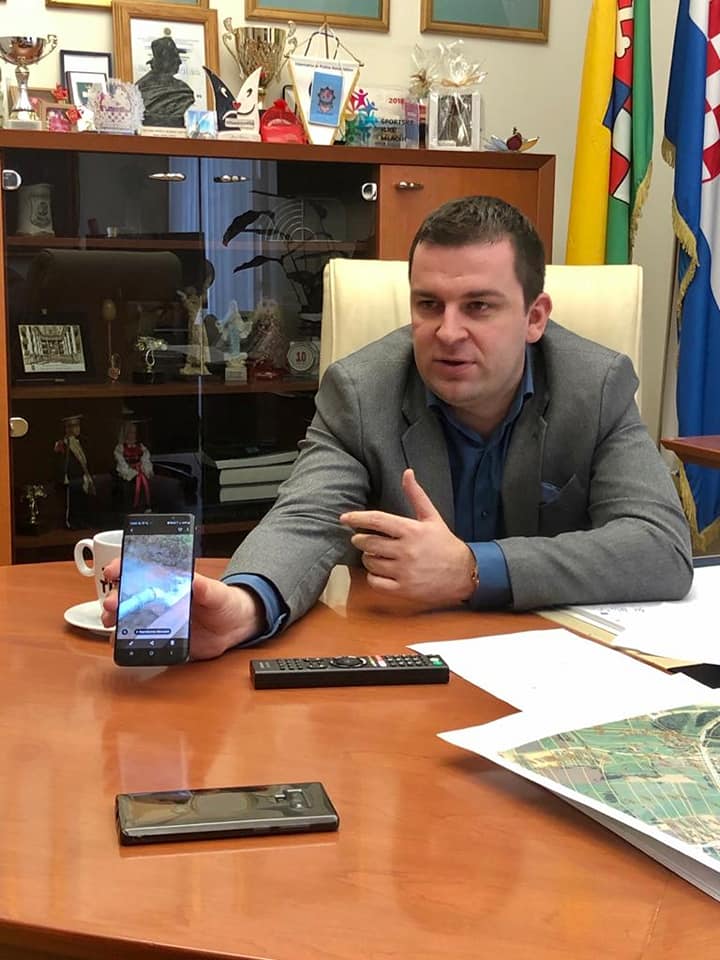
He has made a very impressive start, as the numbers show. When he started, his budget was 130 million kuna, then 148 million in 2018, 180 million last year, and it will be over 200 million this year. As the income grows, he wants to keep the expenditures on the same level, while pouring the surplus revenue into tax reductions, projects, and stimulating the economy. Bjelovar was bottom of the list for extracting EU finds when he started, now it is in the top 10 towns in Croatia.
His small digital revolution is still largely in beta mode, but there are already concrete results, and he gave me a couple of examples. The monthly payroll used to take the employee three days to perform. Now, with much of it digitised, that process is performed in just three hours.
There are now ten concrete services that can be performed online via the dedicated app which has been created. New-born babies are entitled to 1000 kuna from his administration. Previously, that would have involved a visit to the office from the young mother, forms to be filled in, another meeting, period of checking and approval, and so on. Now that can all be done from home online, without all the stress of taking the young child around the famous Croatian bureaucratic system.
The plan is to put almost all services online in the same way. Quicker services, less public administration needed, more efficient procedures, and all without the need to leave the house and queue to get the blessing of a grumpy official.
Standard practice in countries like Estonia. Absolutely revolutionary for Croatia.
One of the first acts he did as mayor was to cut social welfare where it was not needed. Bjelovar has an unemployment rate of 6%, around 200 people. Rather than continue with the generous benefit for the unemployed, he announced that he would be happy to pay it to those without a job who reported for work at his administration, where they would be put to work as required. Of the 200 contacted, just four showed up for work, which meant that 196 had their benefits cut. More money in the administration's budget, less cash simply given to people who did not want to work. More votes under threat as vested interests are challenged.
"If someone genuinely needs help, an operation or something, then the city is ready to help absolutely," said Hrebak. "But why should the city cover someone's laziness? This whole system was created by HDZ and SDP, which are both social parties. We have literally made invalids out of people. Sadly, the most important question in Croatia today remains - are you left or are you right?"
The mayor is putting a lot of faith and investment into IT and attracting foreign investment. There is a tax-free model for foreign investors regarding local taxes (he cannot influence tax policy at the national level) - land for one kuna, communal tax one kuna, communal contributions one kuna, free space, electricity and other utilities. Bjelovar has the biggest startup contest in Croatia, with prize money of 100,000 kuna, and judges from the entrepreneurial and banking worlds. The University of Bjelovar's first IT graduates have all found employment.
And the investors are coming. TCN recently reported on the first geothermal power plant in Croatia, which was built by Turkish investors with an investment of over 40 million euro under a concession. Hrebak says the return on investment will take just six years, and also that there are other thermal water sources which can provide three more plants. His plan is to build a spa in one of these locations with city money, then find an investor to build the second hotel the town so badly needs. It will be located just 50 metres from the exit of the new stretch of motorway which will open in 2-3 years - and eventually connect Bjelovar with Budapest, making this an attractive spa stop for Hungarians heading to the coast.
He is disappointed, but not surprised, that no other town has followed his lead, despite many fine words about fighting corruption.
"I know 5-6 young mayors, and I am sure that they are not corrupt. But despite the words, they have done nothing. The reason is the system - they are scared of losing those votes which will cost them power. This is the cycle we have to break in Croatia, in order to progress."
"This is a long, long fight, a marathon. The only way to make this change is through patience and persistence. We will keep on trying, delivering excellent services, cutting tax and administration, and providing the best incentives for foreign investment. We are small, with just 1% of support, but we are trying. My city is corruption-free."
And, as he went to take a first sip of the cup of tea that he made several hours ago, I concluded that I for one would not bet against Dario Hrebak expanding his digital and transparent revolution far beyond the borders of Bjelovar, especially if international institutions and the EU took a greater interest and offered support.
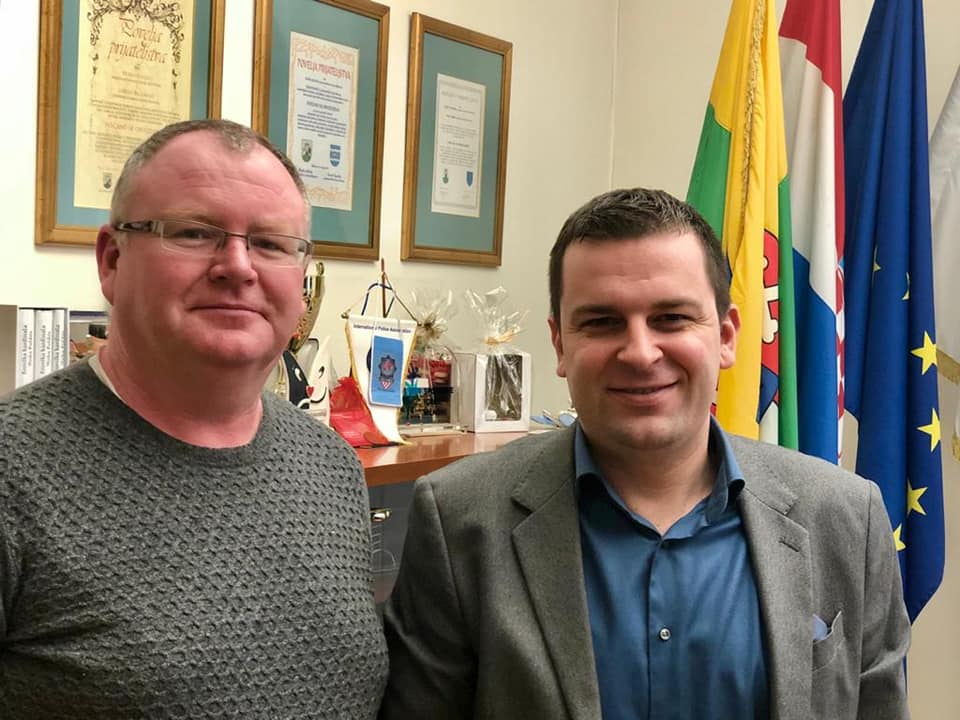
it is a topic we will be returning to very soon. For the very latest from Bjelovar, check out the dedicated TCN section.
Daniel Coulton Shaw on the Patient Experience at EPIC 2020 in Dubrovnik
January 29, 2020 - The first European Patient Experience and Innovation Congress will take place in Dubrovnik from March 19-21. TCN catches up with co-organiser, Daniel Coulton Shaw from Global Clinic Rating to find out more.
1. The term 'patient experience' is something relatively new in terms of medical tourism conference themes. Tell us what you mean by it, and why people will be hearing a lot more about it in the future.
Wikipedia states that Patient experience (PX) is defined as the sum of all interactions, shaped by #healthcareorganization culture, that influence #patient perceptions across the continuum of care.
For me, in my own clinic and the clinics I consult for, I look at patient experience (PX) as simply "everything we say & do". No matter if we are a single doctor, a private medical practice, medical clinic or speciality hospital, a patient experience always occurs, and it's something we can usually influence directly.
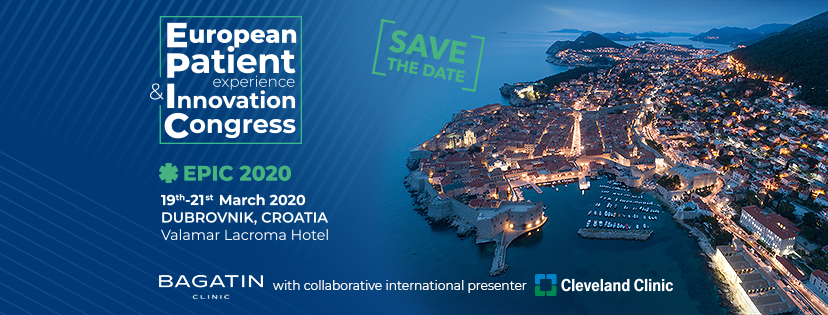
2. How did you get involved in organising EPIC and what will you be talking about in your presentation?
A Croatian healthcare entrepreneur called Ognjen Bagatin invited me to be part of the organising committee along with Irving Stackpole, both of whom I respect greatly for their impact on the medical travel market both in Croatia and beyond. Both of them not only work in healthcare make a profit, but are truly focused on improving healthcare for all, not just their clients. I share that passion and am honoured to work with them to have the chance to bring lasting improvements to the provision of healthcare with central Europe and beyond.
With all the experienced healthcare companies and presenters sharing technological advances brought to us by the digital age, I'm going to cover a part of patient experience beyond that, and that is building and excellent patient experience through empathy.
I'll be taking participants on a journey through a patient experience map - how to notice, measure and improve on what a patient sees, hears, thinks & feels, says and does. Going beyond the bottom line, and building medical centres of excellence on patient empathy. I'm excited!
3. You have a great personal story of initially helping a dentist do a website in Bratislava, which mushroomed into your GCR business today, and now you have a very good understanding of clinics in Central and Eastern Europe. Which countries are performing best in terms of paying attention to detail in the patient experience, and tell us about any individual examples of excellence?
It's hard to single out individual countries that are "performing well" inpatient experience, as it is to find a country that has the best customer experience in coffee shops. Starbucks do a great job of systematising the coffee drinking experience, but it's hard to beat that little Italian "cafeteria" in a forgotten corner of the country where the barista strokes your dog, asks about your leg and moves your chair so that you can get a bit of sun on your face between the trees.
It's similar in healthcare facilities. I believe that countries such as Finland, Australia, the Nederlands, the US and Japan have made great strides in building systems around the patient experience, but there are hidden gems everywhere I travel.
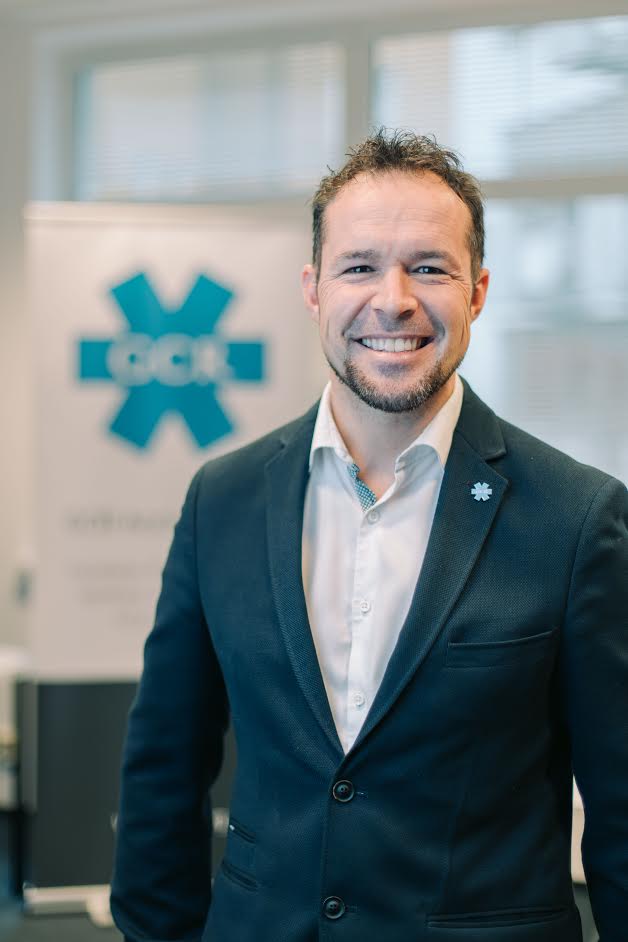
Back to that coffee example. A few months back I wrote an article on Linkedin about a fertility clinic in the Czech Republic, that hired a south American barista simply to create great coffee for their patients. But that's not all. Via social media, he contacts the patients ahead of their visits to ask them simply what do they prefer tea/coffee - black, white, sugar, no sugar. And to the patients surprise as soon as they sit down for the initial consultation with the doctor, the barista brings in their drink just the way they like it - without even asking the patient about it during their visit.
Now I can tell you that many patients who visit fertility clinics don't like to share this private treatment to often on social media - but they do share photos of their fantastic coffee experience, and that has done wonders for this fertility centre in reaching new patients.
4. Why Dubrovnik?
Dubrovnik. We'll who wouldn't want to get out of the office or hospital and go down to Dubrovnik to learn from the world's best inpatient experience. It's a hard offer to turn down.
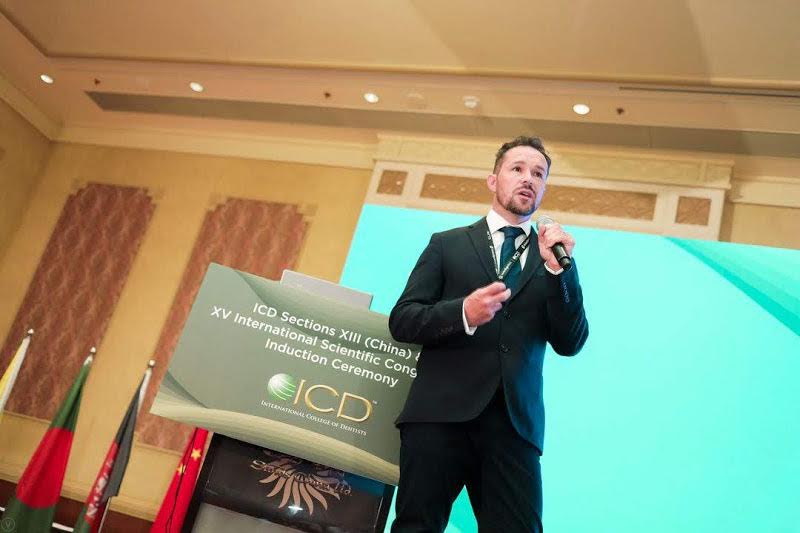
5. Technology is changing the world, and healthcare is no exception. Innovation in healthcare is a core part of EPIC. Tell us a little about this, and what aspects of innovation and technology excite you the most?
For me personally, the most exciting part of current innovation in healthcare is certainly the developments in patient choice. Instead of blindly asking grandma who's the best doctor, going to the nearest available health centre, or at least the ones that have the best marketing, patients can increasingly turn to patient-reported treatment outcomes (results), along with clinically reported treatment outcomes to judge the quality, affordability and value of individual medical centres.
6. There are some great speakers already confirmed. Give us a flavour.
I'm excited about Dave De Bronkart, who learned he had a rare and terminal cancer, he turned to a group of fellow patients online and found the medical treatment that saved his life. Now he calls on all patients to talk with one another, know their own health data, and for healthcare to listen to patients as partners in the new world of participatory medicine.
There's also Thijs De Blok from Buurtzorg, I was blown away when I learned about their self-governing teams of ten to twelve nurses providing both medical and supportive home care services. There are over 10,000 nurses in their teams now, dramatically lowering the healthcare burden in the country, with patient satisfaction scores are 30 percent above the national average 9.1 out of 10. This is no small feat, and they have since replicated similar results in Asia and beyond.
7. You are a regular and popular visitor to the Croatian medical tourism scene, and last year in an interview for TCN stated that Croatia can be a hub for medical tourism for Central Europe. Is that still your belief, and what progress has been made in the last year?
Croatia remains the leading contender within central Europe for elective healthcare. As the cost of treatment between the countries continues to level out, medical travellers are looking beyond affordability to value, quality and experience. With Croatian clinics like Bagatin, St. Catherines, Rident & Svjetlost stepping up their game this year, I believe that the other former Yugoslavian & USSR countries should not get too complacent and comfortable.
Croatia is not relying on the government to support them in reaching international patients, as many of these countries still are. It is through the hard work of the private healthcare sector, and active clusters like Kvarner Health that helping the country to rise, regardless of whether the government notices or not.
With the EU presidency in Croatia, it looks like the right place and the right time.
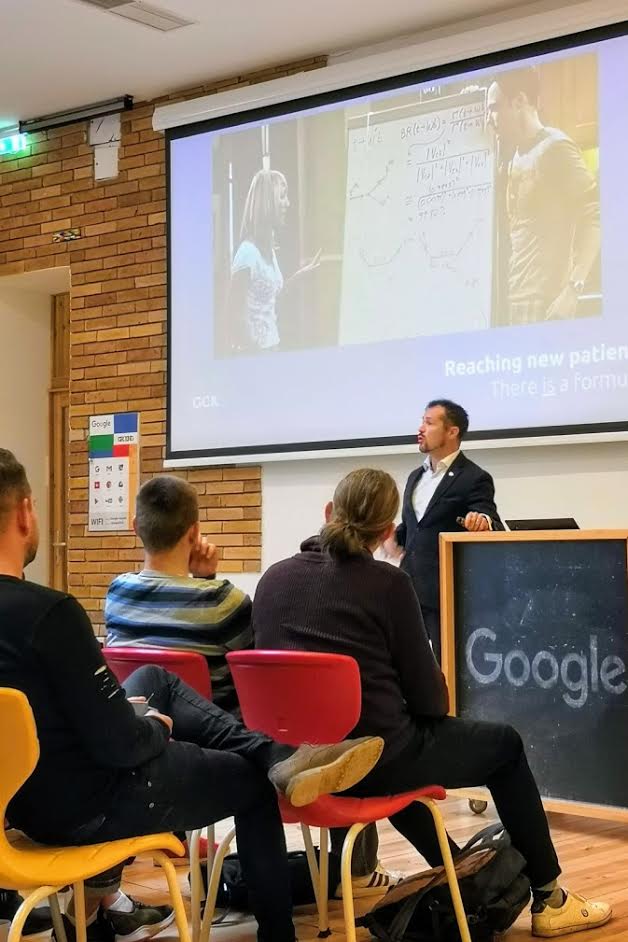
About Daniel Coulton Shaw:
Anyone who knows Daniel Coulton Shaw will tell you that he is an enthusiastic storyteller full of practical ideas that will set your head spinning. His entertaining presentations are largely inspired by the successes and failures from 152 forward-thinking international private medical organizations, health clusters, hospitals, clinics and practices across 26 countries worldwide of multiple specialities. Daniel works closely with this portfolio of leading private clinics, improving the way that these clinics & hospitals reach, book, and engage patients to increase their reputation & results. The patient innovation trends Daniel shares are always supported with insightful data & facts gained through the past 4 years as the ambassador for the GCR the Global Clinic Rating, an award-winning initiative co-founded by an employee of Google to enable both patients & healthcare professionals to compare the apparent quality of almost half a million private clinics & hospitals worldwide. When not on the road, Daniel loves to put theory into practice in the day-to-day running of a successful international dental clinic for English-speaking patients in central Europe that he co-founded back in 2007 as well as spending time “off the grid” with his family – exploring the world beyond phones & screens in the mountains, on the ocean, at great concerts, running races or serving those with limited access to education & care.
You can connect with Daniel Coulton Shaw on LinkedIn.
To learn more about EPIC 2020, visit the official website.
To follow the latest from the Croatian medical tourism industry, check out the dedicated TCN section.
Zagreb: Free Nordic Walking and Fitness for Citizens from 35 to 65 Years Old
ZAGREB, January 30, 2020 - As of Wednesday, citizens of Zagreb aged 35 to 65 can apply to participate in the "Physical activity for health reasons - Getfit4free" project, which includes Nordic walking or fitness classes for three months free of charge, with professional guidance and a personalised approach.
According to data from the European Health Interview Survey, 45.8% of men and 30.5% of women in Croatia are overweight, and 64.8% of Croatians do not participate in any recreational physical activity. The bleak statistics prompted the City of Zagreb and Faculty of Kinesiology to launch the Getfit4free project, a press conference was told on Wednesday.
The goal of the project is to effectively counteract the negative consequences of the working population's sedentary lifestyle through physical activity as part of Nordic walking and fitness programmes (cardio and circuit programmes).
It is also important to raise awareness about the importance of physical activity and healthy habits for maintaining health and increasing the healthy life expectancy, the project manager Damir Knjaz said, adding that the City granted 950,000 kuna (128,000 euro) for the project.
The targeted beneficiaries are groups of physically inactive middle-aged and senior citizens, from 35 to 65 years of age, who are at considerable risk of various health issues due to an unhealthy lifestyle.
"Many studies have shown that physical inactivity leads to health issues in the musculoskeletal, cardiovascular and respiratory systems," said the Dean of the Faculty of Kinesiology, Dean Tomislav Krstičević.
More Zagreb news can be found in the Lifestyle section.
Croatia Partner Country of Italy's Fieragricola Agricultural Fair
ZAGREB, January 30, 2020 - Croatia is the partner country of this year's Fieragricola, Italy's largest agricultural fair, which is taking place in Verona from January 29 to February 1.
Agriculture Minister Marija Vučković attended the opening ceremony on Wednesday on behalf of the Agriculture Ministry as the partner institution.
Vuckovic participated in a panel entitled "Agribusiness in Africa and trade relations with the EU and Italy: Opportunities and prospects", and had a bilateral meeting with her Italian counterpart Teresa Bellanova, with whom she discussed ways of advancing Croatian-Italian trade relations, the Agriculture Ministry said in a statement.
In the context of the Croatian presidency of the Council of the EU, the State Secretary at the Agriculture Ministry, Zdravko Tušek, presented the main characteristics of the Croatian agricultural sector to potential business partners and representatives of the Italian media and the priorities of the Croatian EU presidency in the area of agriculture.
Italy is among Croatia's most important trading partners. Since 2002 it has been among the top three countries for Croatian exports. Agricultural products accounted for 15.52 percent of all exports to Italy in 2018 and for 16.16 percent in 2019.
Last year Fieragricola confirmed its status as the most important European agricultural show, attracting 130,000 visitors, of whom more than 15 percent were business people from abroad.
More agriculture news can be found in the Business section.

